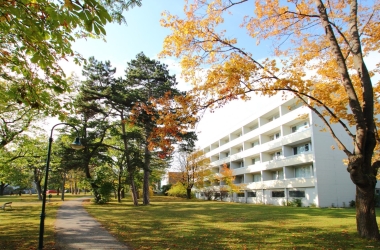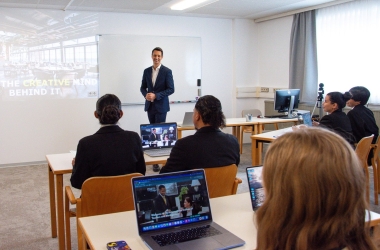Wittenborg Participates in New Private University College in Austria

New Institution Set to Offer Two Bachelor’s and Two Master’s Programmes in Bad Vöslau
Wittenborg is involved in the creation of a new higher education institution in Austria, the International University College Bad Vöslau (IUC), together with the International College of Tourism and Management (ITM) and the Municipality of Bad Vöslau.
IUC is set to offer two three-year bachelor's programmes, one in International Hospitality & Business Management and the other in Human Resource Management & Communication. Also, two master’s programmes in related fields will be offered.
The new school has been made possible by a consortium established between the three partnering institutions, through which ITM owns 60% of IUC, Wittenborg has a 30% share and the Municipality of Bad Vöslau is the owner of 10%.
Since 2022, Wittenborg has worked on this initiative together with its partners. Last year, the new organisation submitted the initial accreditation documentation to complete the formal institutional requirements, and last week, IUC received the positive news that the first part of this process has been completed.
During the next phase of the accreditation, which will take place in May, the new University College will undergo a comprehensive two-day panel visit by a team of five peer reviewers. The assessors will review the application and the programmes submitted for accreditation.
Wittenborg’s role in this process has been extensive, providing input from various departments and faculty members. One of the most active participants has been the Education Development and Quality Management Department (EDQM), based in Apeldoorn, which has provided advice and documentation in order for the project to reach the current stage. During the on-site panel visit, a Wittenborg delegation will be present to accompany the procedures and provide support to the staff from the International University College.
The results are expected to be made available sometime in July, and the goal is that IUC will open its doors in October, at the start of the new academic year in Austria. Although the new institution’s programmes are still under accreditation, they can be advertised and publicised as long as it is clear that accreditation is still to be completed

Initially, each of the bachelor’s programmes of the International University College will offer 30 vacancies for students, and the school will be based in the same facilities where ITM is, at the College Garden Hotel. More details about IUC and its programmes can be found on the institution’s website, https://iuc-bv.at/.
Wittenborg and ITM have been partners for several years, and the Dutch institution used to offer joint programmes together with its Austrian counterpart. The International University College will be supported by both schools, with Wittenborg’s Munich academic staff maintaining an active presence at IUC. Moreover, students who complete ITM’s two-year diploma will have access to IUC’s programmes.
Wittenborg’s president, Peter Birdsall, explained that the Dutch school has played a vital role in supporting the International University College during the accreditation process, leveraging its extensive experience in such procedures. According to him, the establishment of IUC marks a significant milestone for Bad Vöslau, a picturesque spa town renowned for its thermal baths, mineral water and wine production.
“It is highly positive that the Municipality of Bad Vöslau is actively engaged in this initiative because its participation is crucial for the new institution’s success. With the local government’s support, the community will understand the initiative’s significance and recognise the school’s potential benefits for the town, fostering internationalisation and global connections. Moreover, the municipality will assist new students by implementing policies to facilitate their access to housing and employment, among other things,” he emphasised.
Birdsall adds that international partnerships are crucial for Wittenborg because they contribute to the promotion of transnational education and cross-border development. “In a very positive sense, it broadens the horizons for student mobility, staff mobility and research collaboration in the long term. In addition to that, it will create opportunities for the development of new European research projects. All of this is essential for an international business school like Wittenborg,” he concluded.
WUP 07/02/2024
by Ulisses Sawczuk